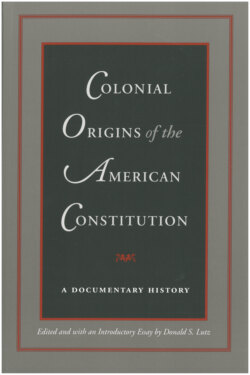Читать книгу Colonial Origins of the American Constitution - Группа авторов - Страница 22
На сайте Литреса книга снята с продажи.
Оглавление15
The Oath of a Freeman
May 14, 1634
This is the oath that replaced the original 1631 version [9], and a comparison of the two is instructive. The earlier version reads as though it creates a subject, whereas this oath, at least in part because it rests on individual consent freely given, reads as though it creates a citizen with political rights and duties. Movement from the mentality of a subject to that of a citizen is one major aspect of a diverging political culture that will by 1776 make Americans and Englishmen political strangers.
Text taken from Charles Evans, “Oaths of Allegiance in Colonial New England,” Proceedings of the American Antiquarian Society, n.s., 31 (April 13–October 19, 1921): 394. The text is complete and unaltered.
Att a Genrall Courte, holden att Boston, May 14, 1634.
It was agreed & ordered, that the former oath of ffreemen shalbe revoked, soe farr as it is dissonant from the oath of ffreemen herevnder written, & that those that receaved the former oath shall stand bound noe further thereby, to any intent or purpose, then this newe oath tyes those that nowe takes ye same.
THE OATH OF A FREEMAN
I. A.B., being, by Gods providence, an inhabitant & ffreeman within the jurisdiccon of this comonweale, doe freely acknowledge my selfe to be subiect to the govermt thereof, & therefore doe heere sweare, by the greate & dreadfull name of the eurlyving God, that I wilbe true & faithfull to the same, & will accordingly yeilde assistance & support therevnto, with my pson & estate, as in equity I am bound, & will also truely indeavr to mainetaine & preserue all the libertyes & previlidges thereof, submitting my selfe to the wholesome lawes & orders made & established by the same; and furthr, that I will not plott nor practise any evill aginst it, nor consent to any that shall soe doe, but will timely discovery & reveale the same to lawfull aucthority nowe here established, for the speedy preventing thereof. Moreouer, I doe solemnly binde myselfe in the sight of God, that when I shalbe called to giue my voice touching any such matter of this state, wherein ffreemen are to deale I will giue my vote & suffrage, as I shall iudge in myne owne conscience may best conduce & tend to the publique weale of the body, without respect of psons, or favr of any man. Soe helpe mee God in the Lord Jesus Christ.
Further, it is agreed that none but the Genall Court hath power to chuse and admitt freemen.
